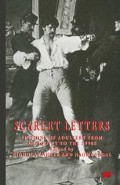Abstract
Insofar as adultery is considered wrongful, in medieval texts, it is often because it is connected in some way with an offence against property. This is either because of the importance laid on legitimate inheritance (which in turn requires wives to be faithful to their husbands), or because of the tendency to see women as themselves a form of property. In La Mort le roi Artu (The Death of King Arthur), however, adultery is presented in relation not to property but to the taking of life. How and why this is so is what this chapter will explore.
Access this chapter
Tax calculation will be finalised at checkout
Purchases are for personal use only
Preview
Unable to display preview. Download preview PDF.
Notes
Quotations are in my own translation from La Mort le roi Artu, ed. Jean Frappier (Geneva: Droz, 1964), cited by paragraph and line number. An English translation, by James Cable, The Death of King Arthur is available in Penguin Classics (Harmondsworth, 1971).
Elizabeth Edwards, ‘Amnesia and Remembrance in Malory’s Morte Darthur’, Paragraph, 13 (1990), 132–46, p. 135.
R.H. Bloch, ‘The Death of King Arthur and the Waning of the Feudal Age’, Orbis Litterarum, 29 (1974), 291–305, p. 292.
Karen Pratt, ‘La Mort le roi Artu as Tragedy’, Nottingham Medieval Studies, 30 (1991), 81–109, p. 96; cf. p. 97, where her phrase ‘the accidental killing of Gaheriet and Gawain’s démesure’ implies the same judgement on the second trial.
See Sarah Kay, ‘Motherhood. The Case of the Epic Family Romance’, in Shifts and Transpositions in Medieval Narrative. A Festschrift for Dr Elspeth Kennedy, ed. Karen Pratt (Cambridge: Brewer, 1994), pp. 23–36, p. 33.
Charles Méla, ‘Life in La Mort le roi Artu’, in The Passing of Arthur. New Essays in Arthurian Tradition, ed. Christopher Baswell and William Sharpe (New York and London: Garland, 1988), 5–14, p. 10.
Copyright information
© 1997 Palgrave Macmillan, a division of Macmillan Publishers Limited
About this chapter
Cite this chapter
Kay, S. (1997). Adultery and Killing in La Mort le roi Artu. In: Scarlet Letters. Palgrave Macmillan, London. https://doi.org/10.1007/978-1-349-25446-0_3
Download citation
DOI: https://doi.org/10.1007/978-1-349-25446-0_3
Publisher Name: Palgrave Macmillan, London
Print ISBN: 978-0-333-68430-6
Online ISBN: 978-1-349-25446-0
eBook Packages: Palgrave Literature & Performing Arts CollectionLiterature, Cultural and Media Studies (R0)

